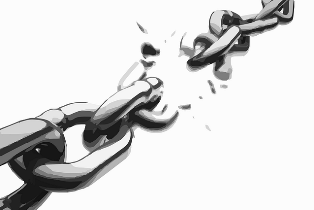
WTI Magazine #49 2014 December, 10
Author : Manuela Bianchi for learnitalygroup.com Translation by:
As we have already pointed out in other occasions, the idioms contribute to enrich the Italian lexicon and constitute one of the most important sectors of our language. Today we talk about the word "rompere" (to break), discovering some interesting facts related to its uses.
To break means "to shatter, smash, crash" and so for example you can break a plate, a glass, etc., or you can break an arm after a bad fall. Figuratively, however, it is said that you can "rompere l'incanto" which means to spoil something that seemed perfect, "rompere gli indugi" which means to take action after an hesitation, "rompere il ghiaccio" when in an interpersonal relationship you do something to overcome the embarrassment, an indecision or a cold start. You can also say "rompere i ponti con qualcuno" when you stop or truncate any kind of relationship with someone, or you can say "rompere l'anima a qualcuno" in sense of bothering him/her.
On the latter point we must add that "rompere" alone can mean to annoy, to bore, to irritate: and so if we are told "non rompere!", it means that we have to stop annoying who said that; on the contrary, if I am the one saying "mi sto rompendo" it means that I am bored.
Two expressions that mean to beat, or to heavily defeat, or to hit, are "rompere le corna" or "rompere le ossa". Instead, if you are thinking too hard looking for a solution to a problem is said that you are "rompendo la (tua) testa". And finally here is an Italian proverb: "chi rompe paga e i cocci sono suoi", which means that he/she who breaks something has to pay for it, meaning that he/she who screw up, will suffer the consequences.
One of the characteristics shared by the Romance languages concerns the complexity of the system of the conjugation of verb tenses and their use. It is obvious that in English things are much less complicated, but in Italian we must pay more attention and in particular we must devote more time to memorize.
For example, let's talk about our remote past and the present perfect tense. In general we know that the first is used to refer to a past that has no relation to the present, while the second is used to express facts happened in the (usually closer) past, the effects of which persist in the present. But it is not that simple. It can be said, therefore, "la Seconda Guerra Mondiale iniziò il 1 settembre 1939", but we can also say "l'uomo è comparso sulla terra all'inizio dell'era quaternaria", even if in this second sentence the fact happened way before the fact described in the first sentence.
So what defines the proper use of the past tense and the present perfect tense? Going deeper, you will find that the use of one or the other does not depend only on the distance in time of the event, but on the attitude with which who speaks perceives the past. The psychological factor of the speaker plays a crucial role in describing something happened in the past. Besides, we can add that the past tense is typically used in literature or in narrative, while in the everyday spoken language it is very frequently replaced by the present perfect tense. In addiction, the past tense is commonly used only in certain regions of the Southern Italy like Sicily, Puglia, Campania and Basilicata, where there is a strong influence of the dialect.
So, as we clarify in all our Learnitaly schools, studying the past tense and especially to memorize the irregular ones is a daunting task, to which a student must submit to complete his/her language training. However, thanks to the choices that the Italian language allows us, we can breathe a sigh of relief considering that Italians well accept without any fuss the less complicated forms of the present perfect tense.



